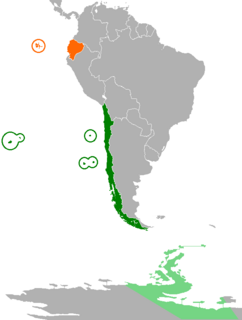
Ecuador, officially the Republic of Ecuador, is a country in northwestern South America, bordered by Colombia on the north, Peru on the east and south, and the Pacific Ocean on the west. Ecuador also includes the Galápagos Islands in the Pacific, about 1,000 kilometres (621 mi) west of the mainland. The capital is Quito.

The Cenepa War, also known as the Alto Cenepa War, was a brief and localized military conflict between Ecuador and Peru, fought over control of an area in Peruvian territory near the border between the two countries. The two nations had signed a border treaty following the Ecuadorian–Peruvian War of 1941, but Ecuador later disagreed with the treaty as it applied to the Cenepa and Paquisha areas, and in 1960 Ecuador declared the treaty null and void.

Oncidium, abbreviated as Onc. in the horticultural trade, is a genus that contains about 330 species of orchids from the subtribe Oncidiinae of the orchid family (Orchidaceae). As presently conceived, it is distributed across much of South America, Central America, Mexico and the West Indies, with one species (O. ensatum) extending into Florida. Common names for plants in this genus include dancing-lady orchid and golden shower orchid.

Zamora Chinchipe, Province of Zamora Chinchipe is a province of the Republic of Ecuador, located at the southeastern end of the Amazon Basin, which shares borders with the Ecuadorian provinces of Azuay and Morona Santiago to the north, Loja and Azuay to the west, and with Peru to the east and south. The province comprises an area of approximately 10,456 km² and is covered with a uniquely mountainous topography which markedly distinguishes it from the surrounding Amazonian provinces. Zamora-Chinchipe is characterized and largely identified by its mining industry; indigenous ethnic groups with a rich archaeological legacy; its biodiversity; and its niche and tourist attractions, which include a number of waterfalls well-noted for their beauty. The province takes its name from the bureaucratic fusion of the Zamora and Chinchipe cantons. The provincial capital is the city of Zamora.

The Hepialidae are a family of insects in the lepidopteran order. Moths of this family are often referred to as swift moths or ghost moths.

The Ecuadorian–Peruvian War, known locally as the War of '41, was a South American border war fought between 5–31 July 1941. It was the first of three military conflicts between Ecuador and Peru during the 20th century. During the war, Peru occupied the western Ecuadorian province of El Oro and parts of the Andean province of Loja.

Quechua people or Quecha people, may refer to any of the indigenous people of South America who speak the Quechua languages, which originated among the indigenous people of Peru. Although most Quechua speakers are native to the country of origin, there are some significant populations living in Ecuador, Bolivia, Chile, Colombia and Argentina.
Cibyra is a genus of moths of the family Hepalidae. There are 50 described species, found throughout Central and South America.
Dalaca is a genus of moths of the family Hepialidae. There are 23 described species found throughout South America as far north as Panama. The larvae feed on grasses.
Druceiella is a genus of moths of the family Hepialidae. There are four described species, although a revision of the genus is being carried out which will add at least four new species. The current species are all found in South America.

The territorial dispute between Ecuador and Peru was the source of a long period of intermittent armed conflict between the two countries. This dispute was a consequence of each country's interpretation of what Real Cedulas Spain used to precisely define its colonial territories in the Americas. After independence, all of Spain's colonial territories signed and agreed to proclaim their limits in the basis of the principle uti possidetis juris which accepts the Spanish colonial borders of 1810 as the borders of the new republics. Thus the borders of Gran Colombia which included Ecuador, Colombia and Venezuela would follow the borders of the Viceroyalty of New Granada, and Peru the Viceroyalty of Peru in 1810. However, Peru was not satisfied with this and tried to set the date of her Uti Possitedis to 1824 – a time when Peru was officially independent with territories Peru militarily occupied since 1820.

Phassodes is a moth genus of the family Hepialidae. As of 2018, it is monospecific, consisting of the sole species Phassodes vitiensis; this species is very variable. It is found in Fiji and Samoa. The life cycle is unknown but the larva is presumed to feed underground on the roots of plants or decaying matter.

Pitcairnia is a genus of plants in the family Bromeliaceae, subfamily Pitcairnioideae. It was named for Dr. William Pitcairn, Scottish physician and gardener (1711–1791). The genus Pitcairnia ranks as the second most prolific of the bromeliad family. They are most abundant in Colombia, Peru and Brazil, but can also be found in areas from Cuba and Mexico south to Argentina. One species, Pitcairnia feliciana is found in tropical West Africa and is the only member of the family Bromeliaceae not native to the Americas.

The Peru national under-17 football team represents Peru in international under-17 football competitions and is overseen by the Federacion Peruana de Futbol.

The following outline is provided as an overview of and topical guide to South America.
Dalaca cocama is a species of moth of the family Hepialidae. It is known from Peru and Ecuador.
Pfitzneriella lucicola is a moth of the family Hepialidae. It is found in Ecuador.
Pfitzneriella similis is a moth of the family Hepialidae. It is found in Peru.

Chilean–Ecuadorian relations refer to official and bilateral tie between Chile and Ecuador. Two countries have embassies in respective capitals.












